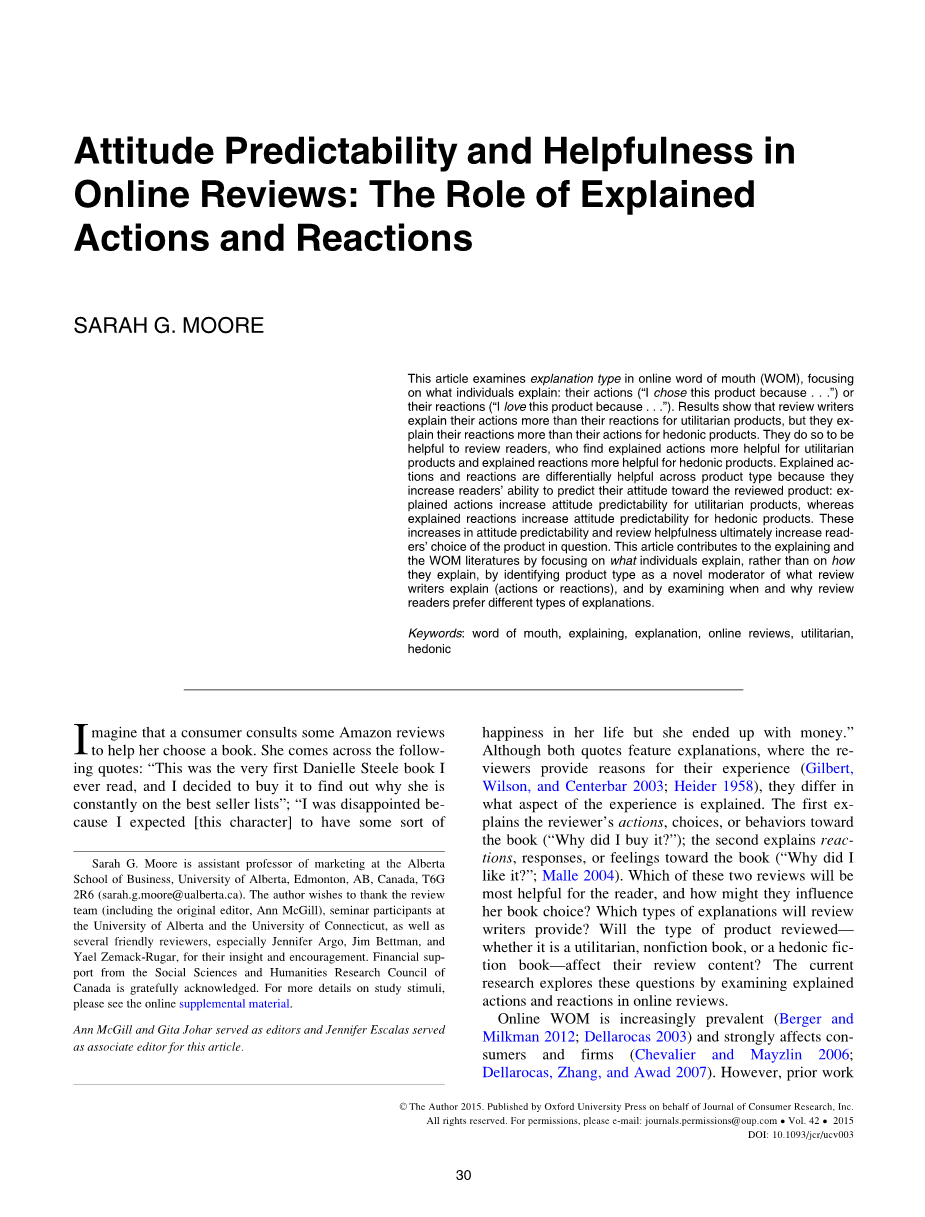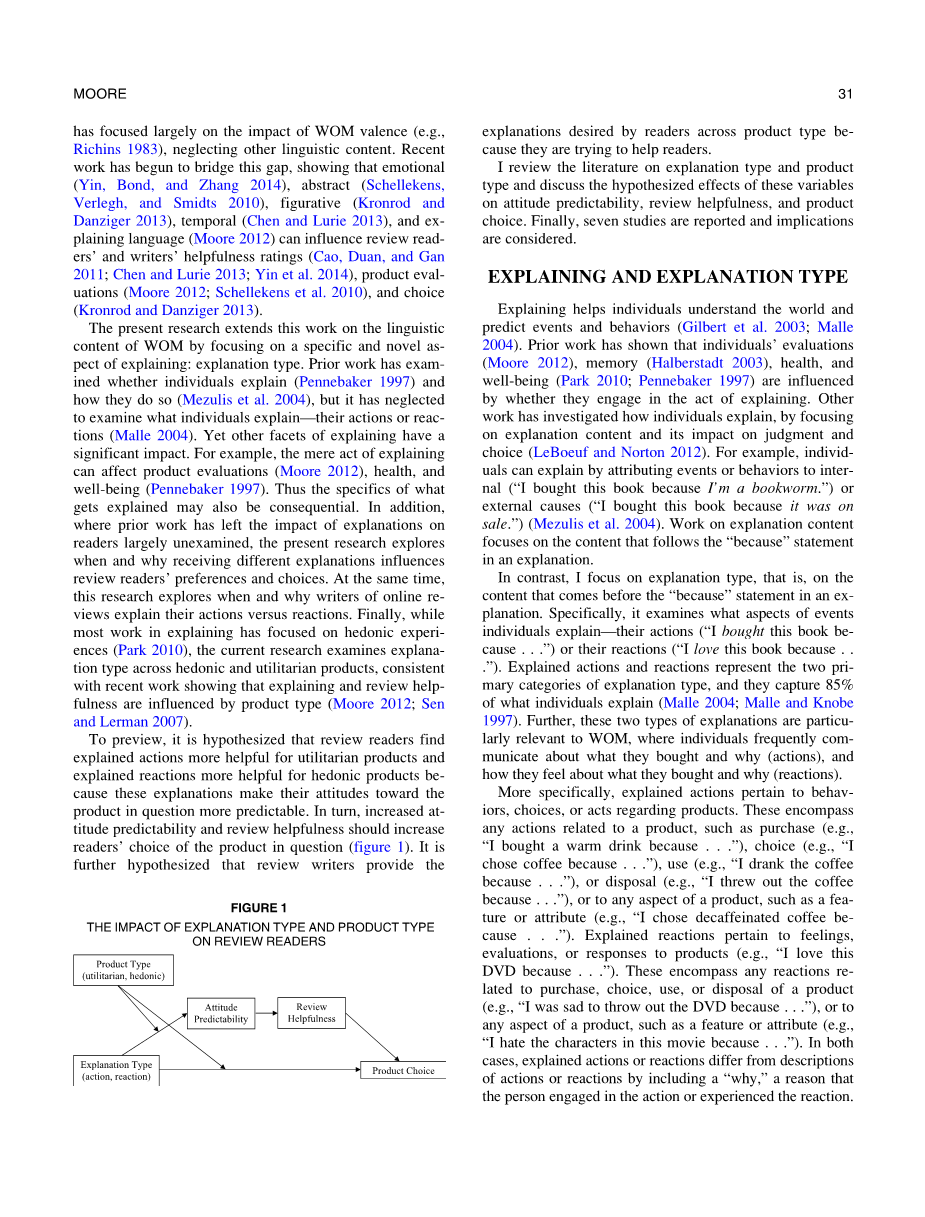

英语原文共 16 页,剩余内容已隐藏,支付完成后下载完整资料
Journal of Consumer Research
2015,Vol.42
DOI: 10.1093/jcr/ucv003
Attitude Predictability and Helpfulness in Online Reviews:
The Role of Explained Actions and Reactions
在线评论中的态度可预测性和有用性:解释行为和反应的作用
This article examines explanation type in online word of mouth (WOM), focusing on what individuals explain: their actions (“I chose this product because . . .”) or their reactions (“I love this product because . . .”). Results show that review writers explain their actions more than their reactions for utilitarian products, but they explain their reactions more than their actions for hedonic products. They do so to be helpful to review readers, who find explained actions more helpful for utilitarian products and explained reactions more helpful for hedonic products. Explained actions and reactions are differentially helpful across product type because they increase readersrsquo; ability to predict their attitude toward the reviewed product: explained actions increase attitude predictability for utilitarian products, whereas explained reactions increase attitude predictability for hedonic products. These increases in attitude predictability and review helpfulness ultimately increase readersrsquo; choice of the product in question. This article contributes to the explaining and the WOM literatures by focusing on what individuals explain, rather than on how they explain, by identifying product type as a novel moderator of what review writers explain (actions or reactions), and by examining when and why review readers prefer different types of explanations.
本文研究了网络口碑(WOM)中的解释类型,重点关注个体解释:他们的行为(“我选择这个产品是因为hellip;”)或他们的反应(“我喜欢这个产品是因为hellip;”)。结果表明,评论作者对功利主义产品的行为解释多于反应解释,但他们对享乐主义产品的反应解释多于行为解释。他们这样做是为了帮助评论阅读者,发现解释行为更有助于功利产品且解释反应更有助于享乐产品。解释的行为和反应对不同产品类型有不同的帮助,因为它们增加了读者预测他们对所评论产品态度的能力:解释的行为增加了功利主义产品的态度可预测性,而解释的反应增加了享乐主义产品的态度可预测性。这些增加的态度可预测性和评论的有用性,最终增加读者斟酌产品的选择。本文通过聚焦于个人解释了什么而非如何解释,以产品类型作为一个评论作者解释的新颖的调节,来测试什么时候以及为什么评论读者更倾向于某种类型的解释,为解释和口碑的文献做出了贡献。
I magine that a consumer consults some Amazon reviews to help her choose a book. She comes across the following quotes: “This was the very first Danielle Steele book I ever read, and I decided to buy it to find out why she is constantly on the best seller lists”; “I was disappointed because I expected [this character] to have some sort of happiness in her life but she ended up with money.” Although both quotes feature explanations, where the reviewers provide reasons for their experience (Gilbert, Wilson, and Centerbar 2003; Heider 1958), they differ in what aspect of the experience is explained. The first explains the reviewerrsquo;s actions, choices, or behaviors toward the book (“Why did I buy it?”); the second explains reactions, responses, or feelings toward the book (“Why did I like it?”; Malle 2004). Which of these two reviews will be most helpful for the reader, and how might they influence her book choice? Which types of explanations will review writers provide? Will the type of product reviewed— whether it is a utilitarian, nonfiction book, or a hedonic fiction book—affect their review content? The current research explores these questions by examining explained actions and reactions in online reviews.
我设想一个消费者通过亚马逊上的一些评论来帮助她选择一本书。她偶然发现下面这段语录:“这是我读过的第一本Danielle Steele的书,我决定买下来,看看为什么她总是在畅销排行榜上。”“我很失望,因为我本期望(这个角色)在生活中会有一些幸福,但她却以金钱收尾。”尽管这两段语录都有自己的特色解释,但其中的评论者为他们的经历提供了理由(Gilbert, Wilson, and Centerbar 2003; Heider 1958),他们对经验的解释各不相同。第一种解释了评论者对这本书的行动、选择或行为(“我为什么要买这本书?”);第二种则解释了对这本书的反应、回应或感受(“我为什么喜欢它?”;Malle 2004)。这两篇评论中哪一篇对读者最有帮助,它们将如何影响她的书籍选择?评论作者会提供哪些类型的解释?评论的产品类型——是一本功利主义的、非虚构类的书,还是一本享乐主义的、虚构的书——会影响他们的评论内容吗?本研究通过在线评论中解释的行为和反应来探索这些问题。
Online WOM is increasingly prevalent (Berger and Milkman 2012; Dellarocas 2003) and strongly affects consumers and firms (Chevalier and Mayzlin 2006; Dellarocas, Zhang, and Awad 2007). However, prior work has focused largely on the impact of WOM valence (e.g., Richins 1983), neglecting other linguistic content. Recent work has begun to bridge this gap, showing that emotional (Yin, Bond, and Zhang 2014), abstract (Schellekens, Verlegh, and Smidts 2010), figurative (Kronrod and Danziger 2013), temporal (Chen and Lurie 2013), and explaining language (Moore 2012) can influence review readersrsquo; and writersrsquo; helpfulness ratings (Cao, Duan, and Gan 2011; Chen and Lurie 2013; Yin et al. 2014), product evaluations (Moore 2012; Schellekens et al. 2010), and choice (Kronrod and Danziger 2013).
网络口碑越来越普及(Berger和Milkman 2012;Dellarocas 2003),并强烈影响消费者和公司(Chevalier和Mayzlin 2006;Dellarocas, Zhang,和Awad 2007)。然而,以前的研究主要集中在口碑效价的影响上(e.g., Richins 1983),而忽略了其他语言内容。最近的工作已经开始弥补这一差距,表明情感(Yin, Bond, and Zhang 2014),抽象(Schellekens, Verlegh, and Smidts 2010),比喻(Kronrod and Danziger 2013),时间(Chen and Lurie 2013),和解释语言(Moore 2012)可以影响评论读者和作者的帮助评分(Cao, Duan, and Gan 2011; Chen and Lurie 2013; Yin et al. 2014),产品评估(Moore, 2012;Schellekens et al. 2010)和选择(Kronrod and Danziger 2013)。
The present research extends this work on the linguistic content of WOM by focusing on a specific and novel aspect of explaining: explanation type. Prior work has examined whether individuals explain (Pennebaker 1997) and how they do so (Mezulis et al. 2004), but it has neglected to examine what individuals explain—their actions or reactions (Malle 2004). Yet other facets of explaining have a significant impact. For example, the mere act of explaining can affect product evaluations (Moore 2012), health, and well-being (Pennebaker 1997). Thus the specifics of what gets explained may also be consequential. In addition, where prior work has left the impact of explanations on readers largely unexamined, the present research explores when and why receiving different explanations influences review readersrsquo; preferences and choices. At the same
剩余内容已隐藏,支付完成后下载完整资料
资料编号:[236122],资料为PDF文档或Word文档,PDF文档可免费转换为Word


